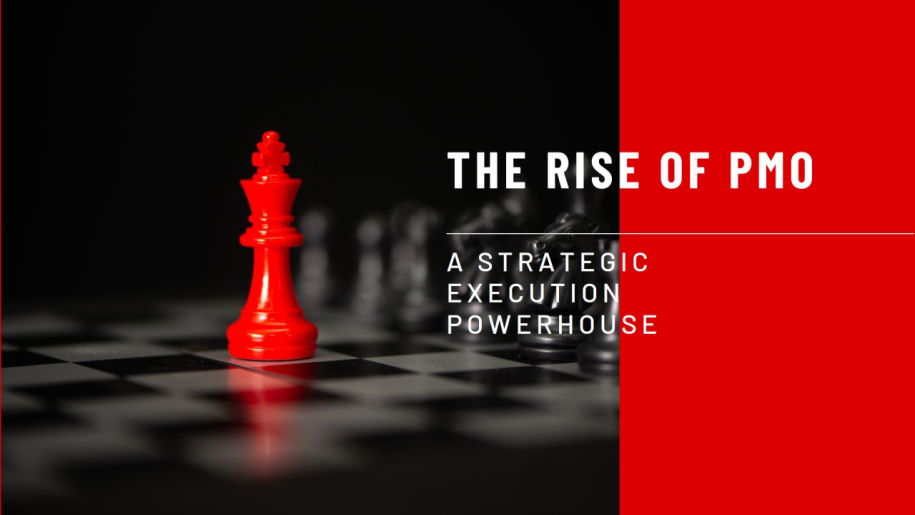Project Management Offices (PMOs) were once seen as bureaucratic entities, largely handling administrative tasks like data collection and report generation that would take commands and orders from project managers, and were mainly considered more of a burden. Junior employees often began their careers buried in these routine activities. However, the rise of digital transformation has significantly reshaped this view and the PMO. Today, PMOs have evolved into strategic execution powerhouses, driving essential business outcomes and ensuring the successful implementation of organizational strategies. Projectmanagers now report into the PMO i.s.o. the other way around.
The transformation of PMOs from support functions to strategic partners is driven by the growing complexity and importance of projects in achieving business goals and as Antonio Nieto-Rodriguez would say; “the upcoming influence of the project economy”. Also digital transformation has played a crucial role in this evolution. As businesses became more technology-dependent and data driven, effective project management control became vital. Projects now aim to drive strategic initiatives, enable innovation, and ensure long-term success, and share a customer centric approach, rather than merely delivering on time and within budget.
Modern PMOs are central to strategic execution. They ensure projects align with organizational goals, optimize resource allocation, and track performance for continuous improvement. Acting as the bridge between strategy and execution, PMOs provide the structure and oversight needed to transform strategic plans into reality. Today’s PMOs prioritize initiatives based on strategic value and potential impact. This alignment is crucial for maximizing return on investment and ensuring resources are invested in the right projects. PMOs also establish and enforce project management standards and best practices, ensuring consistency and quality across projects and using the right tools like ProjectOffice, should not take weeks to design, but can hit the ground running from day one.
Effective resource management & control is another critical function. Strategy execution PMOs optimize resource allocation across projects, maximizing efficiency and effectiveness and make sure that the culture of the organization is transitioning to the new way of working on both culture and employee level. This involves strategic planning and real-time adjustments based on project needs and cultural standing. Performance measurement, involving tracking and reporting using various metrics, provides insights into project health and drives continuous improvement and a hybrid agile approach to strategy execution and project delivery.
Looking ahead, several trends will shape the future of PMOs, including technological integration, agile practices, sustainability, and increased strategic influence. As organizations adopt advanced technologies, PMOs will leverage artificial intelligence and data analytics to enhance decision-making and project outcomes. AI-driven insights will help identify risks, optimize resources, and make data-informed decisions. Advanced project management tools, (like ProjectOffice), will streamline processes, improve collaboration, and provide real-time insights, enhancing overall project performance and control. PMOs will continue embracing agile methodologies, enabling organizations to respond quickly to changing market conditions and customer needs. Agile practices promote flexibility, collaboration, and iterative development, allowing organizations to adapt to new challenges and opportunities. Flexible resource management practices will enable PMOs to adapt to shifting priorities and optimize resource utilization. With a growing emphasis on sustainability, PMOs will ensure projects align with sustainability goals, integrating environmental and social considerations into project planning and execution. They will promote responsible project management practices, ensuring projects are conducted with integrity and transparency.
PMOs are becoming trusted advisors to executive leadership, providing insights on project prioritization and resource allocation. They will contribute to strategic decision-making processes and drive organizational change initiatives, fostering a culture of continuous improvement and innovation.
The Modern PMO Powerhouse: Six Essential Pillars
To visualize a robust PMO, we present a PMO six essential pillars. These pillars represent the core components of an effective PMO and highlight the value they bring to organizations.
1. Build, Operate, and Transition
This pillar focuses on establishing effective PMO control frameworks and methodologies and do it fast almost out of the box.. It involves utilising standardized processes and practices for efficient project execution and facilitating the smooth transition of completed projects to operational teams.
2. Benefit and Value Management
This pillar emphasizes delivering measurable benefits and value aligned with strategic goals. The PMO defines clear objectives, tracks progress, and measures outcomes to ensure long-term value and organizational success.
3. Organizational Cultural Change
Driving organizational & Change change to support a project-oriented culture is crucial. The PMO promotes project management practices, fosters collaboration, and addresses resistance to change, ensuring the organization is well-equipped to execute its strategy.
4. Strategy Implementation
Ensuring projects align with the organization’s strategic objectives is key. The PMO provide insights for selecting and prioritizing projects based on their strategic impact, managing risks and ensuring timely and budget-compliant delivery.
5. Training, Coaching, and Embedding
Building project management capabilities within the organization is essential. The PMO provides ongoing training, coaching, and mentoring, helping employees develop the skills and knowledge needed for project success.
6. ProjectOffice Cloud Tool
Utilizing advanced tools for comprehensive project, program, and portfolio management enhances PMO effectiveness with tools like ProjectOffice. The tool provide real-time insights into project performance, enabling data driven decisions and improving overall project performance.
The transformation of PMOs from administrative functions to strategic execution powerhouses reflects their growing importance in today’s project-driven organizations. By focusing on the six essential pillars outlined in the PMO core pillars, organizations can ensure their PMOs remain effective in driving strategic success. The future of PMOs is bright, with opportunities to leverage advanced technologies, adopt agile practices, and enhance their strategic influence. As PMOs continue to evolve, they will play a critical role in helping organizations achieve their strategic goals and navigate the complexities of the modern business environment.
